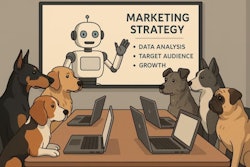
Pet food manufacturers are increasingly turning to artificial intelligence to enhance their marketing effectiveness, according to recent Petfood Industry polling data examining AI adoption across the industry. The technology's ability to process vast amounts of customer data enables companies to create more targeted campaigns that resonate with specific pet owner segments based on behaviors, preferences and purchasing history.
The survey reveals that AI adoption remains in the early stages, however, with more than half of respondents still exploring or planning their AI marketing strategies rather than actively implementing them. This lines up with the Petfood Industry August poll, which showed nearly half of pet food companies have yet to implement AI technology.
AI for data-driven applications, not creative functions
According to the survey results, more than half of pet food industry professionals (56%) are not yet using artificial intelligence in their marketing campaigns, revealing an adoption gap despite widespread industry discussion about AI's potential.
Among companies actively implementing AI marketing tools, customer insights and data analysis dominates usage at 21% of all respondents, suggesting those who have embraced the technology are focusing on data-driven applications rather than creative functions. Content creation ranks second at 11%, while more specialized applications like email personalization (6%) and visual content creation (5%) trail significantly.
The data indicates that while AI marketing adoption remains limited, early adopters are prioritizing analytical capabilities that can directly impact business intelligence and customer understanding over automated content generation.
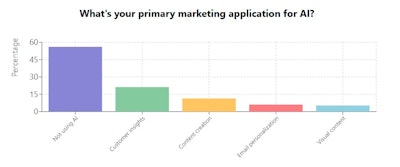
- Not using AI currently: 56.06%
- Customer insights and data analysis: 21.21%
- Content creation: 11.36%
- Email personalization: 6.06%
- Visual content and design: 5.30%
Content production speed emerges as top measurable AI benefit
Pet food marketers who have implemented AI tools report content production acceleration as their most significant measurable impact, with 15% citing faster content creation as their primary benefit. However, the survey reveals a measurement gap: two-thirds (67%) of AI users haven't yet quantified their results, suggesting many implementations remain in experimental phases without proper ROI tracking.
Better audience targeting and engagement, along with improved campaign performance metrics, each captured only 5% of responses, indicating either limited impact or insufficient measurement systems to capture AI's influence on these outcomes. Brand consistency showed slightly stronger results at 8%, suggesting AI tools may be delivering more reliable messaging across campaigns.
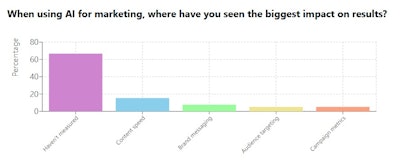
- Haven't measured results yet: 66.67%
- Increased content production speed: 15.38%
- More consistent brand messaging: 7.69%
- Better audience targeting and engagement: 5.13%
- Improved campaign performance metrics: 5.13%
Marketing teams adopt measured approach to AI implementation
Pet food marketing departments are taking a conservative approach to AI adoption, with 56% still in planning or research phases and another 25% limiting experimentation to one or two team members. This grassroots testing strategy suggests companies are prioritizing risk management over rapid deployment.
The data also reveals minimal investment in formal AI training programs, with only 9% of organizations implementing department-wide training initiatives. An equal percentage are testing multiple tools before committing, indicating a thorough evaluation process but potentially slower adoption timelines.
External partnerships remain rare, with just 3% of companies engaging AI specialists or agencies, suggesting most organizations prefer developing internal capabilities rather than outsourcing AI marketing functions.
The predominance of individual experimentation over systematic deployment indicates the industry views AI marketing as an emerging capability requiring careful evaluation rather than an essential competitive tool demanding immediate organization-wide implementation.
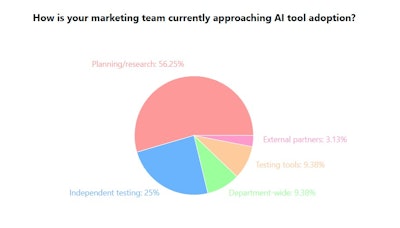
- Still in planning/research phase: 56.25%
- One or two team members experimenting independently: 25%
- Department-wide training and implementation: 9.38%
- Testing multiple tools before committing: 9.38%
- Partnering with external AI specialists/agencies: 3.13%
What will AI do for you in the next 12 months?
Looking ahead, 63% of pet food marketers express satisfaction with their existing marketing tools with little interest in exploring new capabilities. Given the earlier survey results, it seems many pet food brands are in the evaluating and testing phases with AI. As companies experiment and learn AI's capabilities, many may recognize other potential benefits or identify new challenges that AI could address in the future.
Among those seeking new AI capabilities, future interests divide evenly between analytical and creative applications. Predictive analytics for customer behavior and voice/video content generation each captured 13% of responses, while personalized product recommendations attracted 10% interest.
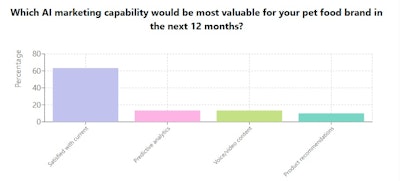
- Currently satisfied with existing tools: 63.33%
- Predictive analytics for customer behavior: 13.33%
- Voice and video content generation: 13.33%
- Personalized product recommendations: 10%
Survey methodology: Data collected September 4-18, 2025, from 119 pet food industry professionals via Petfoodindustry.com polling platform.




